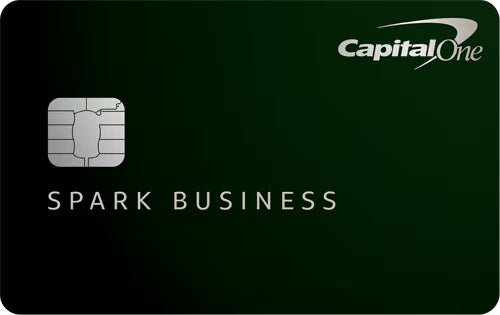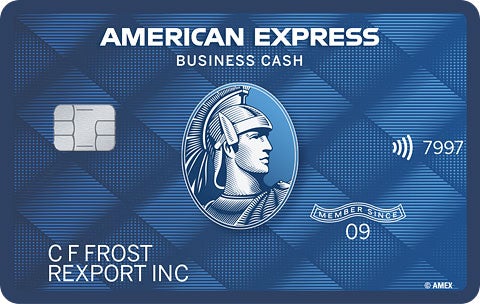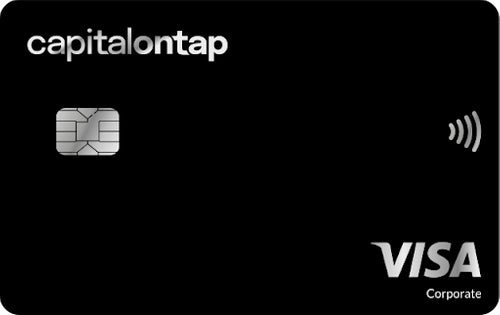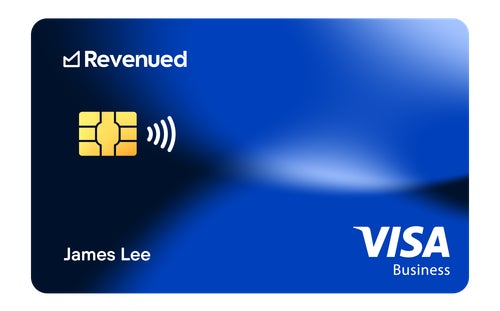| Business Rating: | 2.7 / 5 |
| Rewards Value | 1.0 |
| APR | 1.0 |
| Rewards Flexibility | 0.0 |
| Features | 3.0 |
In a Nutshell:
If you’ve had trouble qualifying for a traditional business credit card or a business loan, the Revenued Business Card + Flex Line combo could be a big help. But its mandatory finance charges mean it may not be a great option for short-term financing.
Rewards Rate None |  |
Sign-up Bonus None |  |
Annual Fee $0 |  |
APR Factor Based (prepaid card; Flex Line factor rate varies) |  |
Sutton Bank Customer Service Ratings:
|  |
The Revenued Business Card + Flex Line is a unique combination of a prepaid card and a business line of credit that could be a good fit if you need access to working capital but can’t qualify for a traditional business credit card or a low-interest business loan.
Unlike those financing options, the Revenued Business Card + Flex Line combo is available to small-business owners with a damaged or limited credit history. The combo also charges no annual or monthly fees and offers flexible spending limits (perhaps larger than you could otherwise qualify for on a loan or credit card).
But this card offers no rewards or a sign-up bonus. And since the Flex Line uses a purchase of future sales financing model — which only gives you access to funds in exchange for a fee based on your expected future revenue — you can’t avoid finance charges like you can with a traditional business credit card with a 0% introductory APR or a grace period on interest charges. This could make the Flex Line a pricey financing option, especially if you only need short-term cash flow.
Pros
- Since approvals are based on business revenue, not credit score, it’s accessible for small-business owners with fair credit or a limited credit history.
- You don’t have to worry about added costs since it carries no annual fee.
- If you have a limited credit history or middling credit score, it may allow you to get access to more funds than you’d otherwise qualify for with a traditional loan.
- You can build credit either by making card purchases or by just utilizing the flex line.
Cons
- Since it uses a purchase of future sales financing model, you can’t avoid finance charges like you could with a credit card that offers a grace period on interest.
- Though it’s available with limited credit history, it still requires applicants to have substantial business revenue to qualify.
Why you might want the Revenued Business Card
Revenued Business Card + Flex Line approvals are based on your business revenue and banking activity, not your credit score. That means this combo could make a lot of sense for small-business owners who can’t qualify for traditional business credit cards or loans or who can’t get a large enough credit line to cover their expenses.
Available with less-than-perfect credit
If you have a damaged credit score or limited credit history, it can be next to impossible to qualify for a traditional business credit card since these cards typically require a good to excellent credit score. This can make it hard for small-business owners to find financing.
In contrast, Revenued Business Card + Flex Line approvals are based on your business revenue and banking activity. So if your business is doing well, you can get access to the funding you need even if you’ve had trouble qualifying for business credit cards or loans in the past.
A decent option for long-term financing
Though the Revenued Business Card + Flex Line combo carries mandatory finance charges, these are easy to calculate based on your factor rate and may give you a clearer sense of how much you’ll pay for access to funding versus traditional interest, which factors in a few more variables and can be harder to plan for.
Your factor rate is a set ratio, typically ranging from 1.1 to 1.5 (essentially 10% to 50% of your purchase cost), and Revenued automatically withdraws funds from your bank account based on your payback terms. For example, if you make a $5,000 purchase at a 1.1 factor rate and a 60-day payback term, Revenued will withdraw a little over $91 from your account per day for 60 days ($5,000 purchase x 1.1 factor rate / 60 days).
This system could help you stay on track with paying off purchases and ensure you don’t get overwhelmed by compounding interest the way you could if you didn’t make large enough payments on a credit card.
Plus, if you qualify for a low factor rate, the Revenued Business Card + Flex Line could also be more affordable than a credit card for longer-term financing. For example, if you were to make a $5,000 purchase at a 1.1 factor rate with an 18-month payback term, you’d only pay $500 in total finance charges. According to the CreditCards.com payoff calculator, if you used a credit card with an APR of 19% (around average), you could end up paying around $750 in interest to finance that same purchase over 18 months. And that’s assuming you kept up with monthly payments of around $335. If you paid less, your financing costs would be even higher.
This could make the Revenued Business Card + Flex Line worth a look even if you have a decent credit score and could qualify for traditional business cards.
Tip: Since your spending limit is based on your business revenue, not your credit score, the Revenued Business Card + Flex Line could also help you access more funding than you’d otherwise qualify for based only on your credit history.
Why you might want a different card
While the Revenued Business Card + Flex Line combo could be a great fit for small-business owners who can’t get access to typical business credit cards or low-interest loans, its purchase of future sales financing model may prove costly.
And though the card is available with less-than-perfect credit, it lacks long-term value without a rewards structure and you won’t be able to take advantage of a welcome offer either. It’s also not the most practical credit-building option and still carries plenty of business revenue requirements that could put it out of reach for many small-business owners.
Finance charges may prove costly
The biggest downside of the Revenued Business Card and Flex Line combo is its cost. Though the card itself charges no annual fee or interest, you won’t be able to avoid finance charges on your Flex Line funds, no matter how quickly you can cover purchases. That’s because the Revenued Flex Line uses a purchase of future sales financing model, which requires you to pay a fee based on your assigned factor rate and the amount of funding you use.
Factor rates typically range from 1.1 to 1.5, so even if you only need to finance purchases over a couple of months, you’ll likely face finance charges of 10% or more. This may prove much more expensive than carrying a balance short term on a traditional business credit card.
For example, if you used $5,000 from your Flex Line and had a 1.1 factor rate with a 90-day payback term, you’d end up paying $500 in finance charges on top of your original purchase cost. According to the CreditCards.com debt payoff calculator, you could pay off that same $5,000 purchase in three months with a credit card with a 19% APR and only face around $150 in interest charges.
Keep in mind, too, that your factor rate could run higher than 1.1, tipping the balance further in favor of credit cards for short term financing.
Here’s a quick comparison of the estimated interest charges you’d face in paying off a $5,000 card balance over different payback periods, versus finance charges with the Revenued Business Card + Flex Line, assuming a low factor rate of 1.1:
| Finance charges | ||||
|---|---|---|---|---|
| 3-month payback term | 6-month payback term | 12-month payback term | 18-month payback term | |
| Credit card with 19% APR | ~$150 ($1,800 monthly payments) | ~$250 ($1,000 monthly payments) | ~$500 ($475 monthly payments) | ~$750 ($335 monthly payments) |
| Revenued Business Card + Flex Line (1.1 factor rate) | $500 | $500 | $500 | $500 |
As you can see, carrying a balance short term on a credit card with an APR around average is more affordable than financing purchases with the Revenued Business Card + Flex Line.
And though the balance may shift in favor of the Revenued Business Card + Flex Line combo versus a credit card for long-term financing, a traditional business loan is likely a better fit in those circumstances. After all, business loans typically carry even lower interest rates than business credit cards.
For example, if you paid back a $5,000 business loan with an 8% interest rate in 18 months, you’d pay a total of around $322 in interest according to Bankrate’s business loan calculator. With a 1.1 factor rate on the Revenued Business Card + Flex Line, you’d be looking at $500 in total finance charges.
Tip: If you only needed a month to pay back your purchases, you could completely avoid interest on a credit card with a grace period. You may even be able to avoid interest for a year or more with a business card that carries a 0% introductory APR offer.
Not a fit for especially small businesses
Though this business card and flex line combo is available with a less-than-perfect credit score or a limited credit history, it still carries its share of approval requirements. To qualify, you’ll need a business bank account with a minimum average daily balance of $1,000, three or fewer days with a negative bank balance and a minimum gross business revenue of $20,000 per month.
The first two requirements should be easy for most small-business owners to meet, but the $20,000 monthly revenue requirement may put the card out of reach if your small business is especially small or more of a side hustle than a full-time business.
Impractical for building credit long term
Since the Revenued Business Card is technically a prepaid card — not a credit card — you won’t build credit history or have a chance to boost your score based on your payment history unless you tap into your Flex Line.
Since using your Flex Line comes with mandatory finance charges, it could be unnecessarily expensive if you’re looking for a way to improve your credit score over the long term. You’ll almost certainly be better off getting a secured credit card (business or personal) or an unsecured card that carries a low annual fee and is available with fair credit or a limited credit history.
For example, the Capital One QuicksilverOne Cash Rewards Credit Card is available with only fair credit, requires no security deposit and earns 1.5% cash back on all purchases. Though it comes with a $39 annual fee, this is far lower than the finance charges you’d pay on even a relatively small Revenued Business Card + Flex Line purchase (even $500 in spending with a 1.1 factor rate would cost $50 in finance charges).
Once you’ve built a good credit history, you can try applying for traditional business credit cards or low-interest business loans, either of which could be a cheaper financing option than the Revenued Business Card + Flex Line.
How does the Revenued Business Card + Flex Line compare to other business cards?
While the Revenued Business Card + Flex Line combo offers small-business owners with damaged or limited credit history a chance to finance expenses, the funding it offers comes with mandatory finance charges. If you have a decent credit score and don’t need to carry a balance long term, you can likely find a cheaper option. If not, it may be worth comparing the terms on a traditional business loan with those of the Revenued Flex Line or waiting and working on your score with a secured card instead.
But if you’re within striking distance of “good” credit score (a FICO score of 670 or higher), consider applying for one of these alternatives, which should be less expensive as long as you pay off your balance quickly:
 |  |  |
Rewards rate
| Rewards rate
| Rewards rate
|
| Welcome bonus | Welcome bonus | Welcome bonus
|
| Annual fee $150 | Annual fee $0 | Annual fee $0 |
Other things to know
| Other things to know
| Other things to know
|
Revenued Business Card vs. Capital One Spark Cash Plus
Though it carries an annual fee, the Capital One Spark Cash Plus could be a more rewarding flexible financing option than the Revenued Business Card + Flex Line combo, especially for big spenders and small-business owners who can pay off their balance within one billing cycle.
Along with the 2% cash back you’ll earn on all purchases with the Spark Cash Plus, you can get your $150 annual fee refunded every year you spend at least $150,000. Even if you don’t reach that threshold, you can offset its $150 annual fee via cash back with just $7,500 in annual spending.
The card also carries no preset spending limit, so it should offer plenty of flexibility. Keep in mind, however, that the Spark Cash Plus is a charge card, so you must pay off your balances in full each billing cycle. This makes the card ideal for small-business owners who need a lot of purchasing power, but don’t need to carry a balance for more than 30 days.
Revenued Business Card vs. Amex Blue Business Cash Card
If you have at least good credit, the Amex Blue Business Cash Card could offer the perfect mix of low fees, high cash back and payment flexibility. It charges no annual fee, earns 2% cash back on your first $50,000 in spending (1% after that), and, perhaps most notably, comes with a 0% introductory APR on new purchases for your first 12 months as a cardholder (after which a 16.74% - 26.74% Variable APR applies).
If you pay off your balance by the end of this card’s intro APR period, you’ll completely avoid interest charges, making it a great option for financing business expenses. The Revenued Business Card + Flex Line, in contrast, would likely require you to pay 10% to 50% of your purchase cost for access to those funds (based on your factor rate), regardless of your payback period length.
Even if you needed to carry a balance beyond the end of the Amex Blue Business Cash Card’s intro APR period, it would likely take months for those interest charges to match the Revenued Flex Line’s finance charges.
Revenued Business Card vs. Capital on Tap Business card
Tap Business card’s flat cash back rate is decent, especially if you can qualify for a rate on the lower end of its APR range ( 17.49% to 61.92% variable APR ). Carrying a balance for a few months with on the Capital on Tap card, for example, would be much cheaper than paying finance charges with even a 1.1 factor rate on the Revenued Business Card + Flex Line.
The Capital on Tap Business Card is also an especially good option if you’re unsure whether your credit score is high enough to qualify you for the best business credit cards. You can apply for the card with no impact to your credit score — an extremely rare perk on traditional credit cards. The card also comes with a chance at a credit limit as high as $50,000, which should give most small-business owners plenty of purchasing power, even if they don’t feel comfortable committing to a charge card.
How to use the Revenued Business Card
- Only use the card for purchases you can’t cover with a traditional credit card that carries a grace period on interest or a 0% intro APR.
- The longer your payback period, the more likely you are to save money on finance charges versus carrying a balance on a traditional credit card.
Is the Revenued Business Card right for you?
If you’ve had trouble qualifying for a traditional business credit card or a business loan with a low interest rate, the Revenued Business Card + Flex Line combo could be exactly what you need to get access to working capital. While you can’t avoid finance charges, you can use the card to cover essential expenses while having a clear sense of how much those funds will cost you.
That said, if you haven’t applied for a traditional business card recently and your credit score is decent, it may be worth trying again. As long as you pay off your card balance in full each statement period or only carry a balance for a few months, you’ll likely save more money with a business credit card than with the Revenued Business Card + Flex Line.
If you need long-term financing, a low-rate business loan will likely save you more than the Revenued Business Card + Flex Line. You may also be able to get a card that offers a 0% introductory APR on purchases, which would help you avoid interest on purchases for a year or more.
* All information about the Capital on Tap Business Credit Card and Spark 1% Cash Back Business Credit Card has been collected independently by Bankrate and has not been reviewed or approved by the issuer
All reviews are prepared by CreditCards.com staff. Opinions expressed therein are solely those of the reviewer and have not been reviewed or approved by any advertiser. The information, including card rates and fees, presented in the review is accurate as of the date of the review. Check the data at the top of this page and the bank’s website for the most current information.
Responses to comments in the discussion section below are not provided, reviewed, approved, endorsed or commissioned by our financial partners. It is not our partner’s responsibility to ensure all posts or questions are answered.
Partner Offer
